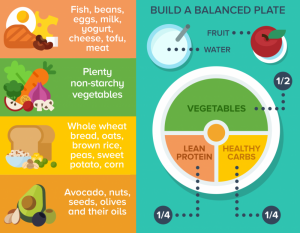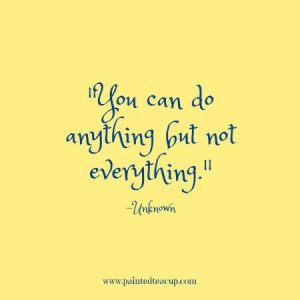KaziHealth lifestyle interventions
 KaziHealth, a workplace health promotion programme that forms part of the larger KaziBantu project, was specifically designed for lower resourced environmental settings.
KaziHealth, a workplace health promotion programme that forms part of the larger KaziBantu project, was specifically designed for lower resourced environmental settings.
KaziHealth integrates 3 lifestyle interventions, namely: (1) physical activity, (2) nutrition, and (3) stress and sleep management, to help participants reach their personal health goals.
Let’s look at these 3 components in more detail:
1. Physical activity
A key ingredient of a healthy lifestyle is activity.
- You can use the FITT principles to monitor your exercise. According to the World Health Organization, try the following to promote health and prevent disease:
- Frequency: Try to be active for 3 to 5 days a week.
- Intensity: Activity intensity should be moderate or vigorous.
- Type: Aerobic activity (like jogging), strength activities (like body weight exercise or weightlifting), and flexibility activities (like stretching or yoga).
- Time: Try to accumulate either 150 minutes of moderate activity or 75 minutes of vigorous activity per week.

Some strategies can include:
- Start small and build up gradually – just 10 minutes at a time can provide benefits.
- Use nearby outdoor gym facilities – you don’t need a membership to a gym.
- Incorporate the entire family – healthy, active living start during childhood.
- Use your beak time to get active – take a 10-15 minute walk around the school grounds during lunch breaks.
- Use weekends to be physically active and take time to find activities that you enjoy – soccer in the park with the kids, catching up with a friend over a neighbourhood stroll or a Saturday morning YouTube yoga session before the kids wake up. The possibilities are endless!
- Participate in the weekly park run. Is there any other fun, active weekend activities in your neighbourhood?
- Get your colleagues involved by making it a challenge to be more active together. We’re always stronger together!

Remember to start small.
Rome wasn’t built in one day. So, how about doing one or more of the following?
- Try standing more and sitting less. This uses more muscles and burns more calories. Can you take a 10-minute standing break for each hour of sitting?
- Use the stairs wherever possible – every step counts!
- Turn waiting time into moving time – have you tried calf raises while waiting in a que?
- Encourage 3-5 minute in-class activity breaks – high knees, jumping jacks or bicep curls with a big book.
- No time is no excuse! Break activities down to 10-minute bouts – once in the morning, once over lunch, once before bed and you’re all done for the day.
- Aim for 10 000 steps per day. See how far from the entrance you can park to get your steps in.
2. Nutrition
A well-balanced diet provides the body with energy, nutrients, vitamins and minerals. Remember, you are what you eat!
A balanced meal during a day includes the following:
- Fruit and vegetables (1 serving size: both hands)
3 servings of vegetables (e.g. dark green, red and orange vegetables) and 2 servings of fruit per day.
- Whole grain products (1 serving size: closed fist)
3 servings of whole grain products per day (e.g. legumes, whole wheat bread, brown rice). Limit sugar, white bread or rice and sweet treats, like muffins.
- Protein (1 serving size: palm of your hand)
1 portion of lean protein per day.
Include more plant-based protein (e.g. beans, lentils, chickpeas). Avoid processed meats (e.g. viennas, polony, ham and bacon).
- Healthy fats (1 serving size: tip of your thumb)
2 portions of healthy fats per day (e.g. fats from plant origins like nuts, seeds and grains). Limit animal fat in diet (avoid margarines, mayonnaise, full cream dairy products and salad dressings).

- Stay hydrated
Try to drink between 1 and 2l of water per day.
Avoid sweetened beverages (e.g. fizzy drinks and fruit juices), and sweetening coffee and tea with sugar or honey. Limit alcohol to 1 serving per day, max 3 servings per week.
 Here are some useful tips:
Here are some useful tips:
- If you feel tired or stressed do not indulge in sugary snacks. Rather substitute sugary snacks for a piece of fruit or a bunch of nuts.
- Slowly cut down on the sugar you use in your coffee or tea. Try to reduce the sugar by ½ a teaspoon per week. You won’t even realise the difference!
- Substitute full cream dairy products with fat free or low fat dairy products.
- Reduce the amount of salt you add to your food by not adding salt to cooking and removing the salt shaker from the dinner table.
3. Stress and sleep management
With every new day, new week, new month or even new year – different responsibilities, challenges and change can cause more stress!
Do you experience the following?
- Fatigue
- Muscle Tension
- Headache
- Depression or irritability
- Nervousness
- Demotivated at Work
- Sleep Disorder
- High Blood Pressure
 If the answer is YES, you might suffer from stress…
If the answer is YES, you might suffer from stress…
Stress can be defined as a state of physical, mental or emotional strain or tension resulting from adverse or demanding circumstances. Stress can lead to burn out if it is not identified at an early stage and managed.
Recognise stress early by asking:
- How do I know that I am stressed?
- What are my physical stress reactions?
- What thoughts / feelings do I have when stressed?
- What do I do when I am stressed?
Observe your thought processes:
- Recognise stress-inducing thought.
- Interrupt stress-inducing thoughts.
- Replace negative with positive thoughts.
- Laughing ☺ helps, especially in stressful situations.
Here is a few stress management techniques.
- Include 30 minutes of moderate intensity physical activity into your daily routine. See the activity section above!
- When stressed, focus on your breathing: Close your eyes and inhale through your nose and exhale through your mouth. Slowing down your breathing can slow down your heart rate. Repeat the deep breaths for 1-5 minutes.
- Eat more complex carbohydrates. Avoid sugar, white flour, caffeine and alcohol. Increase fruit and vegetables in your diet. Stay hydrated by drinking 1-2l of water daily.
- Include relaxation exercise daily such as stretching exercises or yoga. These are great in the morning, or just before bedtime – which will aid in sleep.
- Develop a sleep routine to improve quality of sleep. Try the following: At the same time every evening: take a bath, put on your pyjamas, brush your teeth, read a few pages or listen to calming music as you drift asleep. The routine lets your body know you are ready for sleep. Before long, it will become a habit and help you fall asleep faster.
Try some of these techniques today and see how it can help you manage stress and improve your sleep quality.



